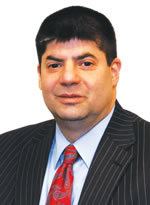Allegro
A free and open internet?
In a big decision, the FCC opens the door to net neutrality
Volume 115, No. 5May, 2015

Art: Mindscanner via istockphoto.com

Harvey Mars, Esq.
Imagine going to a car dealership and being given the following choice. For a nominal fee you can purchase a car that has a maximum speed of only 30 miles an hour. However, a car with a top speed of 180 is also available, but at a substantial premium that most people could not afford. Well, if you are like most people, you would be relegated to driving in the 30-mile-per-hour car. Those who could afford the faster vehicle would have a huge advantage over you. While this scenario is unlikely to ever occur with respect to automobiles, it almost did with respect to Internet access!
The Internet is the most democratic platform that has ever existed. Anyone who has access to a computer can broadcast their views worldwide, usually for free. However, this universal access was in jeopardy quite recently. The companies that own the backbone of the Internet (which include Verizon, Comcast, AT&T and Time Warner) wanted to have the ability to have more control over the data being sent over the Internet, including control over speed and – some people feared – actual content. This set off alarm bells with the public for a number of reasons. The Internet Service Providers (or ISP’s) could decide to charge more for activities that use more data, like streaming, YouTube or Internet phone calls. In the worst case scenario, these companies could choose which areas of the Internet to speed up and which to slow down, based on content. For example, they could slow down or block web traffic belonging to their competitors. Many feared that this would cause the Internet to lose its democratic nature. (While it has not been documented, it is believed that some ISP’s have already been manipulating Internet access for certain clients.)
Is this legal? For many years the Federal Communications Commission tried to develop and impose regulations to ensure that all data sent across the Internet is treated equally. This is often called an open Internet or – you may have heard this term – “net neutrality.”
But prior to this year, the FCC’s efforts to create enforceable net neutrality regulations were sucessfully challenged in court. For example, in 2010, in Comcast Corp v. FCC, 600 F. 3d 642, the U.S. Court of Appeals for the D.C. Circuit knocked down a regulatory scheme developed by the FCC to ensure net neutrality because the FCC had failed to classify ISP’s as “common telecommunication carriers” subject to regulation under the Telecommunications Act. Because the FCC had designated ISP’s simply as “information service providers,” the court found that they lacked any statutory authority to regulate them. A similar successful challenge to the FCC’s imposition of disclosure, anti-blocking and anti-discrimination requirements on broadband providers happened last year.
In order to prevent similar challenges to neutrality regulations, in February 2015, by a 3-to-2 vote, the FCC reclassified broadband service providers as telecommunications providers, thus rendering them a quasi-public utility subject to regulation under Title II of the Telecommunications Act. FCC Chairman Tom Wheeler exclaimed that this reclassification was essential because Internet access was “too important to let broadband providers to be the ones making the rules.” This vote was historic, but reaction was divided upon party lines. Republicans denounced the action and declared that it would likely deter investment, undermine innovation and harm consumers. Greater regulation of the Internet was decried as unnecessary governmental control. Democrats hold a contrary view and see this as an essential step in preserving equality and democracy. What is remarkable is that the FCC’s reclassification of ISP’s was the result of a year-long grassroots effort by various advocacy groups such as the Future of Music Coalition. The FCC received over four million comments, mostly in favor of net neutrality. Without such an effort, the FCC might not have acted so favorably.
It is inevitable that these regulations wil be subjected to a barrage of attacks, similar to what has happened with the Affordable Care Act. However, it seems unlikely that these challenges will make much of an impact given that the reclassification squarely places ISP’s under FCC control. As it now stands, we can all speed down the Internet without fear of being pulled over.
Harvey Mars is counsel to Local 802. Legal questions from members are welcome. E-mail them to HsmLaborLaw@HarveyMarsAttorney.com. Harvey Mars’s previous articles in this series are archived at www.HarveyMarsAttorney.com. (Click on “Publications & Articles” from the top menu.) Nothing here or in previous articles should be construed as formal legal advice given in the context of an attorney-client relationship.
